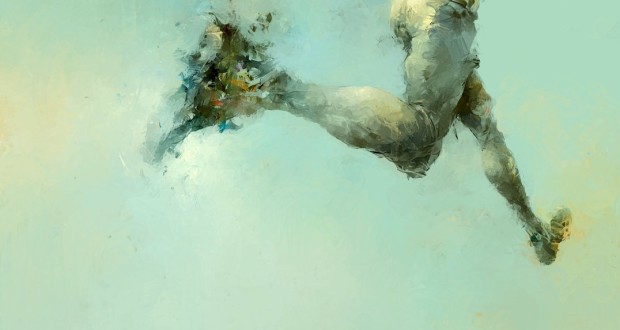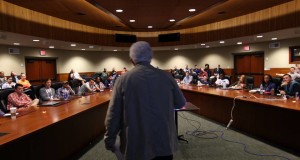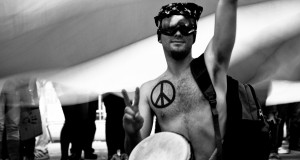In anticipation of the release of my upcoming novel, Jump, I wanted to offer some answers on a few questions I think readers and media might have regarding the book. I hope you enjoy!
How did the idea for this novel originate?
Originally, Jump was supposed to be a short story, maybe 2,000 to 3,000 words at most. I wrote the first draft while in Iraq, and for some reason it started with this image in my head of a little boy jumping off a tree to prove God he loved Him. That image wouldn’t let go, so I said, “Fine, I’ll write a quick short story.”
When I hit 3,000 words, I realized I had so many questions I couldn’t answer unless I added a lot more pages. “Who were his parents? How is a boy supposed to escape this kind of mindset?” I loved how strange the setup was, but I had to grow the story into a novel. And I really wasn’t ready for that.
How was this novel influenced by other books?
When I decided Jump was going to be a novel instead of short story, I became stuck. I asked myself, “Okay, now what? What is Christopher supposed to do now?” Around that time, my roommate in Iraq (a fellow Soldier) asked if I had ever read The Pilgrim’s Progress by John Bunyan. He was shocked when I told him I didn’t. I think he had found an old paperback copy at our MWR, and he told me I had to read it. That really helped me propel my novel.
How similar is Jump to The Pilgrim’s Progress?
To be honest, after reading Pilgrim’s Progress, at first I wanted to write a modern-day parallel of the classic. I was ready to call the main character Christian and create all these parallel allegorical characters with names like Worldly, Faithful and so on. But whenever I tried to think of Jump in those terms, it felt really forced. I had to allow the novel to take on its own shape and venture on its own path. Pilgrim’s Progress provided an initial spark and a general guidance toward what I wanted Jump to accomplish. One thing I did decide, however, was to inject hidden meaning into the characters’ names.
Can you provide some examples of a few characters?
Instead of “Christian” I named the protagonist Christopher Dove. Dove, obviously, is a symbol of the Holy Spirit, but his name also has an Italian translation of Cristofolo Colombo, or Christopher Columbus. But while Columbus went on a journey to find land, Dove goes on a journey of faith to find God in the book. Another example is one particular pastor named Halwyn Light. Halwyn is Welsh for Salt, so his name really means Salt and Light. I’ve done things like that with most of the characters in the book. Other names are intentionally ironic, such as a church leader whose last name is Noble, but is actually both ambitious and cowardly.
How long did the novel take to finish?
From the first line to final revision, the novel took more than 8 years to complete, and that feels like an incredibly long time. I can actually write in really heavy bursts. If I sit down to write a chapter or two, I can easily knock out anywhere from 3,000 to 10,000 words in a single sitting. But the process slowed down for various reasons. First, I took a break from Jump to complete and publish my last book, Amidst Traffic, which has done fairly well for a short story collection. Another reason was that I decided to limit my writing schedule to just one day a week because I also work full-time for the Army Reserve as a photographer and journalist (which requires a lot of travel), my wife and I run a photography business together, and with all those priorities I couldn’t allow writing to consume the rest of my time and neglect my family. But I think the biggest reason this novel took so long is because the novel tackles a lot of my own personal sins, faith struggles and fears.
What were some of your fears in writing and publishing Jump?
The biggest fear I had (and still have) is the backlash the novel might provoke in the general Christian community. During his journey, Christopher visits and attends several churches of different denominational backgrounds, finally ending up in a cult led by a power-hungry leader. I intentionally don’t call out any specific denominations because that’s not really the point. The point was to show the neglect and danger that occur in churches who are more worried about pleasing man (whether pleasing a congregation or pleasing the church leadership) than they are about really honoring God. I grew up Catholic but I now belong to a Reformed Presbyterian community that I respect and love. Being in the Army, I travel a lot, and when I have the opportunity, I visit churches in other parts of the country of other denominations or worship styles, and I know that my book, Jump, is in many ways directed at them because I see a lot of foolishness in the way preachers teach about salvation or how they conduct worship in general. So part of my fear is I didn’t want Jump to read like a voice of judgment, especially because I’m certainly not qualified to do so, but I hope that Christian readers are confronted in their conscience by some of the scenes and moments they experience in the novel.
Why was it important for Jump to tackle the topic of sexuality through pornography?
Pornography is a destructive force. There have been studies that show the brain reacts to a pornography addiction in the same ways it behaves to a drug or substance abuse addiction. Not only that, but we as an American culture have grown an addiction to sex in general, to the point where we have lied to one another that the pinnacle of freedom we can ever reach as individuals is by climbing the hill of sexual independence and shouting our liberty. But promiscuous sex is a prison, it’s made us into slaves (men and women alike). Pornography, specifically, is a huge distortion of reality. I’ve struggled with the addiction to pornography ever since I was a little boy. I’m talking 8 or 9 years old. When I was 11 or 12 and I first caught glimpse of pornography on a computer screen, I was sinfully thrilled and spiritually terrified because now I could access pornography at will. It’s been a battle I’ve fought my entire life, even in marriage, and I think pornography has obvious correlations with other aspects of the sexual culture we live in. It’s become an idol. So many of us worship it above all else. We judge relationships by it. We judge freedom by it. We judge equality by it. We’ve become sexually drunk, insane even.
How is this novel relevant to Christianity today?
Too many modern churches unfortunately have concluded that the Bible (and the Orthodox view of the Gospel), as it was written and recorded, is no longer relevant today, particularly to young people. As a result, churches across the country have tried to modernize their worship service or adjusted their preaching and sermons to fill the gap of relevancy. The irony is that they’ve made themselves more irrelevant than ever by focusing on man (what man must do, feel, accomplish or whatever …) rather than focusing on God’s holiness, grace and will in our lives. I would actually say that most of these churches can be counted among our Christian brethren, but sometimes they spew messages that are in complete contradiction to the Gospel. The Gospel is not what man can do. Doing good to others is not the Gospel. The Gospel is what God has done for us. Our response (our actions) is evidence of the Gospel. It’s a byproduct, not the driving force. So many of us forget this simple distinction because we’re so fixated on our behavior, actions and accomplishment. When somebody asks: “What must I do to be saved?” and we respond with any kind of “to-do” list, then we might as well tell them to go climb a tree and jump, and if they land safely then they’re saved. That’s basically the crux of the novel, and that’s so hard for us to accept. We certainly can give people Biblical guidance for living a life consistent with God’s character (repent, believe, pray, persevere, trust and so on …), but none of those things actually assure salvation for anyone. Not even baptism ensures salvation. The things we do (baptism included) serve as a sign of a life committed to Christ.
What do you hope readers get out of this book?
The first thing I hope is for readers to realize that theology (what we believe about God) matters. In fact, I believe theology is ultimately a matter of life and death. Knowing and understanding God’s character helps us trust Him. Theology is not just petty discussion between academics and scholars. Anyone who calls himself a Christian should care (at least at some level) about theology. And I say that as a layman Christian. I’m not a scholar or trained in divinity. I graduated with an English writing degree from the University of Pittsburgh. I have no formal training on scripture, but I’ve been incredibly blessed to grow in a community of believers that approaches scripture with a sober-minded and academic mindset. But obviously, the Gospel must impact both a man’s mind and his heart. There is no one or the other. God wants both our hearts and our minds committed to Him. And so that’s my hope for this book, that it causes people to reflect and in their reflection to respond emotionally to God’s call.
(Note: Feature image by Zalas)
 Michel Sauret – Award-Winning Army Journalist | Independent Author Award-Winning Army Journalist, Independent Author
Michel Sauret – Award-Winning Army Journalist | Independent Author Award-Winning Army Journalist, Independent Author






